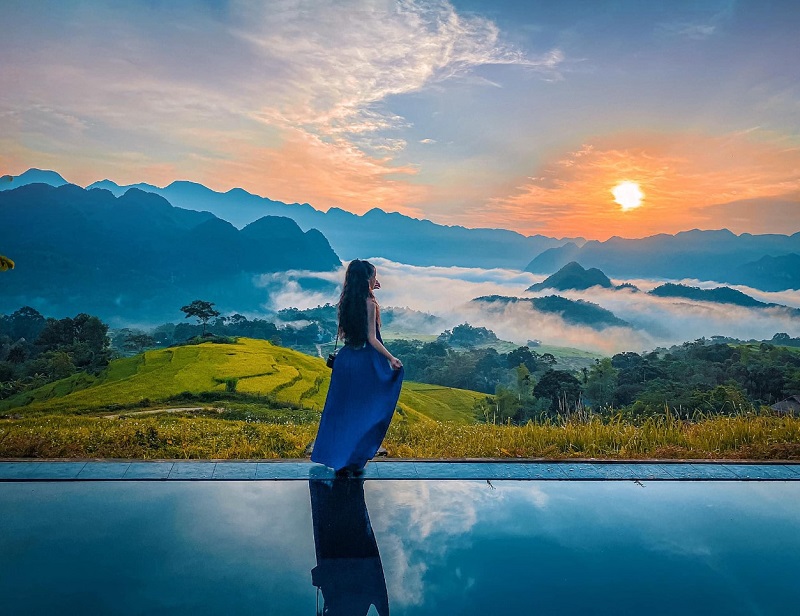Vietnamese Culture
Language, Hanoi Cuisine, and Lunar New Year
Vietnamese culture immerses visitors in vibrant history, culinary traditions, and holidays that interweave with daily life. Especially in bustling capital Hanoi, language, iconic cuisine, and festivals like Lunar New Year colorfully convey Vietnam’s heritage and hospitality. The lyrical Vietnamese language musicalizes conversations across the country. Meanwhile, delicious dishes using fresh regional produce highlight Hanoi’s epicurean distinction. And when the Lunar New Year sparks two weeks of observance, unified celebrations immerse all generations in Vietnamese culture’s richness.
The Flowing Tones of Vietnamese Language
While Vietnam’s vernacular language combines an array of dialects and overseas influences,
standard Vietnamese relies on distinctive swirling tones. With six different phonetic inflection possibilities, strategically arched or dipped syllables shape words and meanings. Conversations emerge in tuneful strings, as lilting, rising vowels dance across sentences evoking Vietnamese language’s innate artistry.
.jpg)
Foreign words also got absorbed across occupation eras, as Chinese number words and French leftovers pepper phrases. Yet Vietnam energetically standardized and modernized language too, adopting a Romanized writing system and mandatory education driving high literacy. From lyrical conversations to the globally accessible immersion of learning script, languages vitally convey Vietnamese culture.
Iconic Cuisine Traditions of Hanoi
As a chaotic capital city woven with lakes, temples, and millions of zooming motorbikes, Hanoi also exemplifies Vietnamese cuisine excellence. While specialty dishes span every region, Hanoi shines as an epicurean vortex showcasing the country’s finest street food fare to elegant upscale dining. Fine-tuned recipes masterfully balance sweet, salty, bitter, sour and spicy to create pleasing harmony, using ingredients showing Vietnamese terrain’s fertility too.
Phở noodle soup remains an obsessive national point of pride – with regional beef or chicken renditions. However,
Hanoi cuisine starring gently fatty beef slices steeped in anise-scented bone broth. Bún chả grilled pork perfects charcoal flavor infusion too. Beyond iconic noodle dishes, snacks like bánh cuốn rolled steamed rice crepes abound alongside excellent beer culture and Vietnamese coffee’s dark chocolate richness. In the capital, Vietnamese cuisine culture overflows through legendary street stalls and gourmet high dining.
.jpg_tmp.jpg)
Lunar New Year Traditions
During the iconic Tết Nguyên Đán spring festival celebrating
Vietnamese New Year, celebratory Vietnamese culture streams brightly through two weeks of customs. As Vietnam’s biggest and most important holiday, Lunar New Year centers traditions around luck, hope and family unity for the coming year.
Fragrant peach blossoms and kumquat trees adorn homes, shops and temples in decorative luck rituals. Gifts of tea, fruits and sweets get exchanged between loved ones as gestures of good fortune wishes. On the New Year Eve feast, families gather over sticky rice cakes and bounteous shared plates before lighting firecrackers to welcome the new year. Subsequent days honor generations of ancestors in graveyard sweeping rituals or temple vigils burning candles and incense. From elaborate foods to spiritual customs, Lunar New Year concentrates Vietnamese culture into vivid observances treasured nationwide.
Language musicality, delicious epicurean traditions, and resonant festivals distinguish Vietnam’s cultural essence and enduring hospitality. While bustling changes occur across development surges, heritage and celebration run vigorous through Vietnamese culture’s soul.
If you are in Vietnam and interested in discovering more about Hanoi – the capital and its significance, we invite you to join us at
Free Walking Tours Hanoi. We’ll take you across the building, and provide you with a unique perspective of the city.
Book now and don’t miss out on this amazing experience.


.jpg)
.jpg_tmp.jpg)